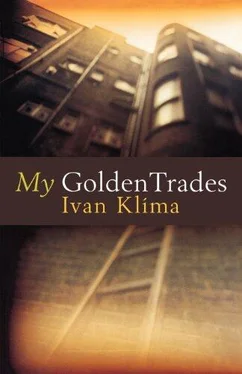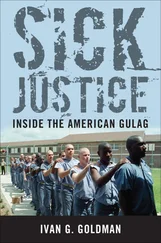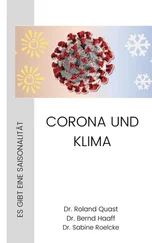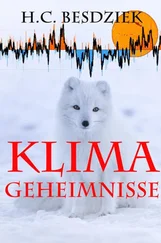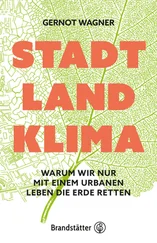Ivan Klima - My Golden Trades
Здесь есть возможность читать онлайн «Ivan Klima - My Golden Trades» весь текст электронной книги совершенно бесплатно (целиком полную версию без сокращений). В некоторых случаях можно слушать аудио, скачать через торрент в формате fb2 и присутствует краткое содержание. Год выпуска: 1998, Издательство: Granta UK, Жанр: Современная проза, на английском языке. Описание произведения, (предисловие) а так же отзывы посетителей доступны на портале библиотеки ЛибКат.
- Название:My Golden Trades
- Автор:
- Издательство:Granta UK
- Жанр:
- Год:1998
- ISBN:нет данных
- Рейтинг книги:4 / 5. Голосов: 1
-
Избранное:Добавить в избранное
- Отзывы:
-
Ваша оценка:
- 80
- 1
- 2
- 3
- 4
- 5
My Golden Trades: краткое содержание, описание и аннотация
Предлагаем к чтению аннотацию, описание, краткое содержание или предисловие (зависит от того, что написал сам автор книги «My Golden Trades»). Если вы не нашли необходимую информацию о книге — напишите в комментариях, мы постараемся отыскать её.
My Golden Trades — читать онлайн бесплатно полную книгу (весь текст) целиком
Ниже представлен текст книги, разбитый по страницам. Система сохранения места последней прочитанной страницы, позволяет с удобством читать онлайн бесплатно книгу «My Golden Trades», без необходимости каждый раз заново искать на чём Вы остановились. Поставьте закладку, и сможете в любой момент перейти на страницу, на которой закончили чтение.
Интервал:
Закладка:
'The only question,' said Bauer, 'is will the forests die out in five years or in ten. I recently ran the Krkonoše and the Jizerské Mountains through the computer. They write about all the reforestation going on, but nothing will ever grow
there any more. And before some mutant species that thrives on sulphur establishes itself, there'll be nothing but rocks left.'
'I don't think it's so hopeless,' said Miss Kosinová. 'People will eventually come to understand that they're destroying the world they have to live in.'
'Sure, people will — maybe,' Bauer admitted. 'But the guys on top couldn't care less. They don't give a damn about our calculations.'
The younger girl began to cry.
'There, there now,' said Miss Kosinová. 'You see, you're only just scaring little children.'
I went with Bauer to get his papers. 'The forest situation doesn't seem so hopeless to her because she's not working on it,' he complained. 'But you should hear her when she's talking about her water full of salmonella. If it were up to me,' he went on, 'I'd devise a programme that would tell us how to take all the garbage that's destroying us and render it harmless before we throw it out — but no one would have it, not even if I gave it away.'
'Do you really think humanity won't survive?' I asked.
'Pretty much,' he said. 'This is how it is: our water is down the drain, the seas are full of oil and all kinds of poison, the air — well, you can see for yourself what kind of shape that's in, forests all over the world are dying or being cut down, soils are being eroded and degraded, the deserts are expanding and the gene pool is shrinking. Add in the degenerating ozone layer, plus a Chernobyl every once in a while, the awful waste products they're cramming down every big hole they can find, and — you just heard Vandas— the hideous new shit they're constantly creating. . '
'How long do we have?' I asked.
'Well,' he said, thoughtfully, 'you could more or less calculate it.' He handed me a bundle of print-outs, I stuffed them into my bag and we parted.
At the bus stop, I discovered that the bus to Komořan had left a few minutes ahead of me, and the next one wouldn't be along for fifteen minutes. As I was taking a book out of my bag to read, I heard a tapping sound behind me, like the sound a blind person makes. And sure enough, when I turned around, there was an enormous old man with a white cane. I had seen him here several times before at this time of day; he was probably going somewhere for lunch. Usually, he had someone guiding him, but this time he was alone, so I asked him if I could be of any help. He thanked me and said that he'd be very grateful if I could take him through the underpass to the other side. He had a rather strange accent, perhaps from Ostrava, or even further east.
As I led him down into the underpass, he counted the steps. When he reached ten, he said, with regret in his voice, 'That's as far as I can count.'
His admission surprised me. 'Where are you from?' I asked.
'From Arobidzhan. In Asia.'
'Somewhere in Russia?'
'It's at ninety-one latitude and fifty-six longitude. Right where they cross.'
'There, you see, you can count to more than ten.'
'No, they told me, and I remembered it.' He started counting the stairs again up to ten. I continued for him to sixteen. By that time we were at the bottom.
'You know how to count?' He seemed astonished. 'How far? To a hundred?'
'About that.'
'Are you a legionnaire?'
'No, why did you think that?'
"There were legionnaires in Arobidzhan. They spoke Czech too.' He began to count the steps going up. When he got to ten, he didn't stop as he'd done before, but merely repeated, on each step, 'Ten, ten, ten.'
'I'm not from Arobidzhan,' I said. 'I've never even heard of it. Is it in Siberia?'
Further than that.'
'I'll find it on the map.'
'Are you a geography teacher?'
'What makes you think that?'
Tou have a map at home.' He stopped to catch his breath.
'I've got a lot of maps at home.'
'Aren't you afraid? Or are you from the cartographical institute?'
'No,' I said, 'I'm a courier.'
'Are you delivering letters?'
'No, other things.'
'Aha,' he said, 'Summonses, warrants, verdicts. Piff, paff, boom!'
'No,' I said. 'I've already said, I'm not from Arobidzhan.'
'That's too bad,' he said. 'You should see it in winter when the Northern Lights come out. Beautiful! And the snow! The harder the times, the more snow there was. And wolves. You'd be interested, because I'll bet you're not really a courier, I'll bet you're one of those artists.'
I was surprised. 'How did you know?' I said.
'Not a musician,' he said. Tou have no ear for music. Just for people. But that's important too.'
We were approaching the exit to the street. In a low voice he counted off the last stairs: 'Ten, ten, ten.'
'Which bus number are you taking?'
'The long bus,' he said. 'To Vrsovice. But you don't have to wait, I'll ask for help.'
In Komořan, I got out at the last stop and savoured the view of the wooded hilltop, but I had to go in the opposite direction, down to the river. The asphalt was sticky in the heat and there wasn't a cool spot to be had anywhere. I walked across a large, sun-baked area and came to a bar, toyed for a moment with the idea of going in, but continued on along a street lined with villas. In the middle of the road, an enormous crane was lifting a steel pipe. Two men in overalls were looking on, a third was sitting in the shade of the machine, drinking beer. Without removing the bottle from his mouth, he signalled to me with his free hand to wait until the gigantic pipe had been set in place in the ditch.
I was standing outside a villa with a cherry tree laden with fruit just inside the fence. Several branches were overhanging the street, but not a cherry was left on them.
I smelled the cherries, at least, and watched while the crane operator skilfully manoevred his unstable load into position. When it was situated properly in the ditch, he turned off the engine and got out. All four men now looked into the hole with approval, then wandered over to a wooden caravan trailer. I could see a case of beer in the shade underneath it.
The institute was at the top of a small hill in a one-storey wooden structure that reminded me of the buildings the Germans constructed during the war for various emergency contingencies; some were used as field hospitals. It was old
and no longer smelled of wood inside, but rather of stale tobacco smoke and old paper, huge piles of which were stacked everywhere. Dr Myslivec's office was at the end of a long corridor lined with heaps of brochures, books and parcels. No one was in. The whole building seemed empty. After all, what would anyone be doing here in this heat? I took the parcel of print-outs from my bag, put it down next to the other bundles of paper in a place where, as far as I could determine, Dr Myslivec could not miss them. Then, one of the glass doors opened and a young woman in a light blouse and a denim skirt looked out.
I said hello.
'You're always smiling,' she said, 'even when you're dragging that heavy bag behind you.' She was rather pretty, though her hair was dyed several different colours.
'But my bag is on wheels,' I said. 'And why shouldn't I smile at you?'
'But you smile even when no one is looking at you.'
I couldn't understand how she could know what I did when no one was looking at me.
'I'll bet this heat is making you thirsty,' she said. 'Would you like me to make you a coffee?.'
'I can't put you to the trouble, not in this heat.'
'I'll have one too. Then you can tell me why you're always smiling.'
Her office looked like all the others. Three desks and a little table with a hotplate. She pointed to an empty chair. 'Won't you sit down?' On a cupboard among stacks of dusty papers there was a forgotten vase. Geraniums and cyclamens bloomed in the windows.
Читать дальшеИнтервал:
Закладка:
Похожие книги на «My Golden Trades»
Представляем Вашему вниманию похожие книги на «My Golden Trades» списком для выбора. Мы отобрали схожую по названию и смыслу литературу в надежде предоставить читателям больше вариантов отыскать новые, интересные, ещё непрочитанные произведения.
Обсуждение, отзывы о книге «My Golden Trades» и просто собственные мнения читателей. Оставьте ваши комментарии, напишите, что Вы думаете о произведении, его смысле или главных героях. Укажите что конкретно понравилось, а что нет, и почему Вы так считаете.
